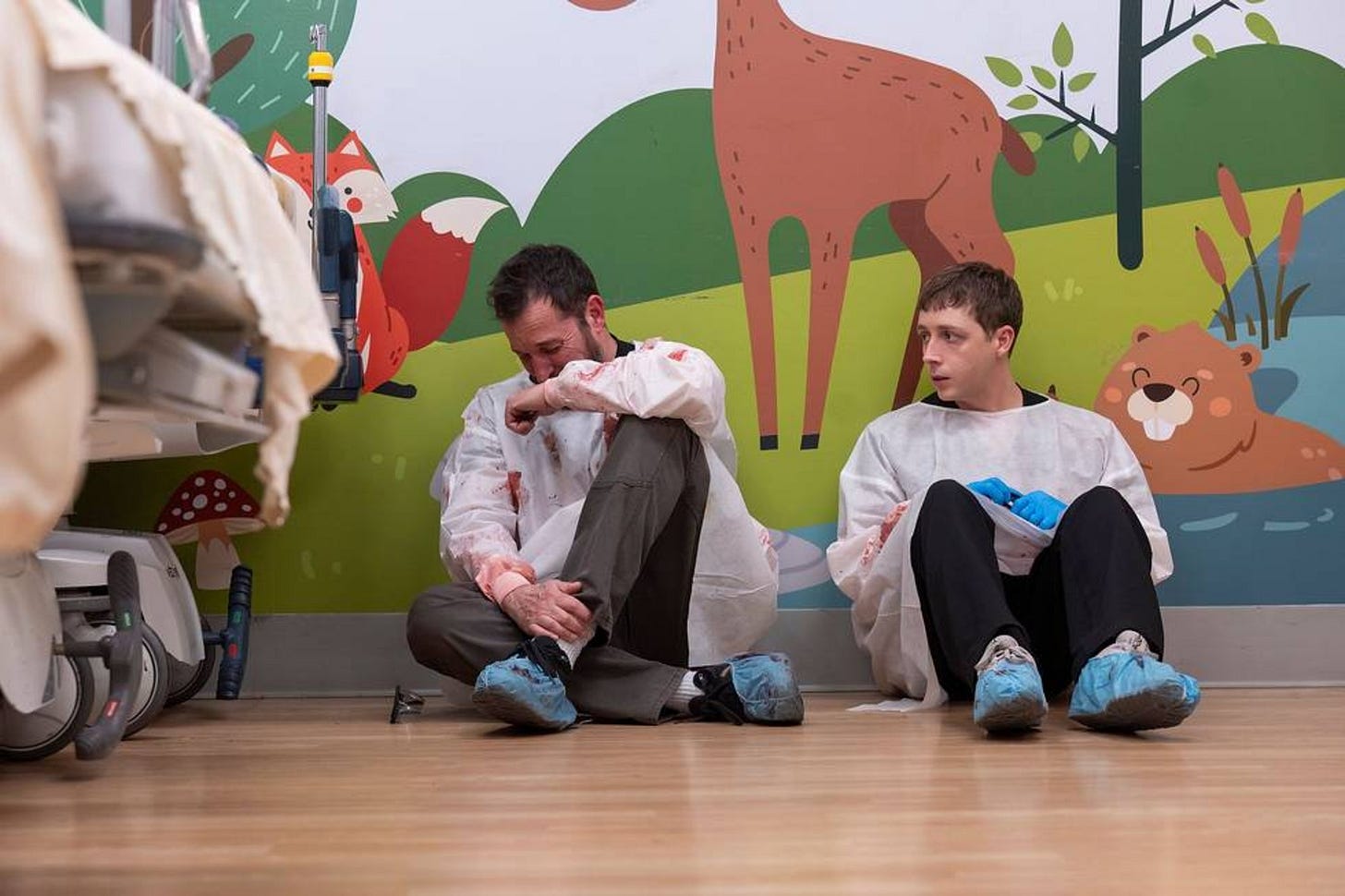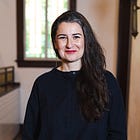How to Save Our Souls
The role of service as restoration.
I flew home from Australia earlier this week, and while discussing jet lag is about as interesting as chatting about the weather, spare me while I tell you that I feel wrecked. I left Melbourne at 9am and landed in Los Angeles at 6am, which made sleep evasive—and also: I started watching The Pitt before we even took off. And I couldn’t stop.
I am resistant to good TV—I can only watch some of the crappy reality stuff—I think because I read so much difficult non-fiction and there’s only so much I can take in. So, while I had heard about The Pitt, I refused to watch, I guess because I knew it would both floor and destroy me. I found it incredibly moving. I laughed a little bit. I cried a lot. My heart broke alongside Dr. Robby, and every other actor in the show. It made me love life, in part because it dealt with death tenderly and honestly. (To that end, I know they consulted Ira Byock, M.D.—an emergency room doctor who has become one of the primary faces of the modern palliative care movement—in the making of the show. He’s also the father of my childhood friend
, a Jungian therapist who is a frequent Pulling the Thread guest. He introduced a distilled version of the Hawaiian Hoʻoponopono prayer to hospice, which Dr. Robby shares in episode four: Please forgive me. I forgive you. Thank you. I love you. Goodbye.)The nurses and doctors who populate The Pitt aren’t in it for the cash prizes or the easy hours (one of the residents is effectively homeless)—there are easier paths in medicine. Practicing this type of care is difficult, as you’re typically attending to people who are having one of the worst days of their lives. Not that I can speak for every medical practitioner in the country, but my hunch is that they do it to be of service. If you have the power to save a life, how can you not use it?
I don’t get to resuscitate and resurrect people for a living (the etymology of resuscitate: Latin, re (back) + suscitare (back)) though maybe I get to help people rediscover their souls. I find a tremendous amount of meaning and service in my job—I’m not only grateful for that, but I also find it sustaining. I think we all want to spend our time doing something that matters—if not to other people, than hopefully to ourselves. And even so, it often doesn’t feel like enough.
I’m working on a bigger piece about morality—and what Rabbi Lord Jonathan Sacks called “Cultural Climate Change”—specifically his concern that we have moved too far from a “We” culture to an “I” culture, one that is increasingly cruel and cold. We’ve survived on this planet through competition, sure, but mostly through cooperation—and communities of care. The community function has waned in recent decades, though maybe the decades to come will see its resurgence: Our survival might depend on it.
In Sacks’ beautiful book Morality: Restoring the Common Good in Divided Times, the last he wrote before he passed in 2020, he pointed out something that other moral psychologists like Jonathan Haidt (The Righteous Mind) have underlined as well: Faith-based communities, however loosely organized, are more philanthropic and do more community service than their fully secular peers.
Here’s Sacks: “An extensive survey carried out throughout the United States between 2004 and 2006 showed that frequent church- or synagogue-goers are more likely to give money to charity, regardless of whether the charity is religious or secular. They are also more likely to do voluntary work for a charity, give money to a homeless person, give excess change back to a shop assistant, donate blood, help a neighbor with housework, spend time with someone who is feeling depressed, allow other drivers to come out in front of them, offer a seat to a stranger, or help someone find a job.” This survey went on to find that churchgoers are more likely to belong to civic groups and to take leadership roles within those groups. “They are disproportionately represented among local activists for social and political reform. They get involved, turn up, and lead. The margin of difference between them and the more secular is large.” In The Righteous Mind, Haidt, referring to the same survey, explains the gap: “Studies of charitable giving in the United States show that people in the least religious fifth of the population give just 1.5 percent of their money to charity. People in the most religious fifth (based on church attendance, not belief) give a whopping 7 percent of their income to charity.” Sacks attributed some of this mindset to the concept of being watched from on high—and worrying about final judgment—but he seems to believe that we also find ourselves in moments where give to others.
He tells a profound story, one that touched me deeply, near the end of the book. It’s the story of a toast from a wedding that trended on Twitter in 2019 where as Muslim-Israeli paramedic, Muawiya Kabha, made a speech at a Jewish wedding for the bride, Shachar Kugelmas. Kabha is part of United Hatzalah, which is a volunteer EMS in Israel with 8,000 members: Their average response time is three minutes or less. (Here in America, there are many volunteer medics—particularly in rural areas—and a huge number of voluntary firefighters. It is a stunning service to us.)
Here’s Sacks:
[Muawiya Kabha] told them that he had first met [Shachar Kugelmas] ten years earlier. He had arrived at the scene of a car crash and found her apparently dead. His was the second ambulance to arrive:
The first ambulance arrived with a doctor. When I arrived there after those initial two minutes, the doctor informed me, “This injured girl, don’t touch her. I have already declared her dead. Let’s treat the driver.” I told him, “Okay, you treat the driver.” I stayed treating Shachar. From above, something told me that I needed to stay treating Schachar.
When I got to Shachar, she was in cardiac arrest. In terms of strict protocol, the doctor was right. We needed to declare her dead. But what I felt from above was that I still needed to try to save her. I did CPR [cardiopulmonary resuscitation] on Shachar for forty minutes, when she was still stuck in the car. The police had already announced on the radio that there was one person dead in the car accident. Shachar’s parents heard the bad news on their way from the North. We continued CPR on the way to the hospital and at the entrance to the hospital, she had a heartbeat. Her heart started to beat.
That night, when I returned home, I didn’t have hope. I put my head on the pillow and thought the Angel of Death might have beaten me. But I knew that I had done everything I could do to try to save her. In the end, I must have done what I needed to do, because look, Shachar is with us.
So I am here to tell Shachar, “Thank you.” Usually the people we save tell us “Thank you.” I want to tell you “Thank you.” And I’ll explain why.
People ask me all the time, “How do you keep going after all the death you see in your work?” The answer is here. Shachar, I am able to continue my work because of you. Because I saved your body. But you saved my soul. Every time that I remember emergency calls that I have been to, I remember you and your smile. Thank you. Thank you. Mazal tov, congratulations, I love you both.
Because I saved your body. But you saved my soul. These two sentences strung together are so profound. Many of us need to recover and resuscitate our souls: May we do that work by caring for each other.
Reminder: I’m hosting an office hours this Sunday, at 11amPT. You can find information on how to join at the top of this newsletter. It will be a low-key community hang and AMA, bring your thoughts and questions!







This blog by Elise continues to speak to me emotionally and intellectually. She offers perspective that needs to be said and says it so others resonate to her words. Please continue to write. We all need your words.
“Because I saved your body. But you saved my soul.” Yes. This is exactly what working in a job like that feels like. The things I see in Pediatric ICU have the potential to wreck me, but I am saved by the people whose lives I am eternally linked to simply because I do the work that I do.